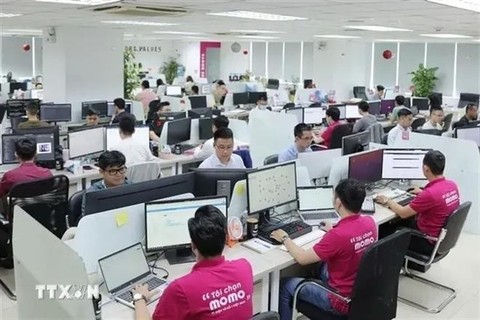
The Momo e-wallet staff at their office. — VNA/VNS Photo
The recent surge in startup activity in Việt Nam has attracted both domestic and foreign investors. However, industry insiders suggest that more efforts are needed to improve startups' access to funding so they can realise their full potential.
Currently, there are about 3,800 startups in Việt Nam, including 11 valued at over US$100 million and three valued at more than $1 billion each, according to the National Agency for Technology Entrepreneurship and Commercialisation Development under the Ministry of Science and Technology.
Funding for these startups primarily comes from state support, investors, foreign and domestic venture funds, funds established by enterprises, incubation centres, business support organisations, angel investors, and loans.
Data from BambuUP, a one-stop innovation platform, shows that there are about 210 venture funds investing in startups in Việt Nam, including nearly 40 domestic funds.
The Việt Nam Innovation and Tech Investment Report 2021, released by the National Innovation Centre (NIC), revealed that $1.4 billion in venture capital was invested in Vietnamese startups in 2021. About 90 per cent of this sum came from foreign venture funds, according to estimates from ThinkZone Ventures, a locally-resourced venture capital firm.
Meanwhile, a report by management consulting firm Bain & Company indicates that Việt Nam is leading Southeast Asia in attracting long-term investors. Investors believe that investment activities in the country will increase by 83 per cent in the 2025-30 period compared to now.
However, experts note that international investors face many challenges when operating in the local startup investment market. Foreign venture funds investing in Vietnamese startups as ordinary foreign investors encounter difficulties in obtaining investment licences, managing their investments, divesting capital, transferring profits to their home countries, and handling tax-related issues.
Due to these challenges, many foreign investors opt not to invest directly in Vietnamese startups but instead require them to restructure and establish parent companies in other countries. This allows them to invest in these parent firms and benefit from foreign incentives. However, this restructuring incurs additional costs for consulting, establishment, and maintenance of legal entities overseas, creating disadvantages for startups operating in an unfamiliar legal environment.
ThinkZone Ventures reports that regulatory issues pose significant challenges when investing in Vietnamese startups. To address this, it is necessary to improve the business climate and establish comprehensive regulations on startup investment.
Bùi Thành Đô, founding partner and CEO of ThinkZone Ventures, stated that policies must support investment funds' activities and create a transparent, equitable, and stable business environment for funds to invest confidently in Vietnamese startups. Preferential policies should also be introduced, such as tax cuts, financial aid, concessional credit, and the establishment of special economic zones with favourable infrastructure and services.
In addition to startups' own efforts, CEO of BambuUP, Nguyễn Hương Quỳnh, believes that to enhance the Vietnamese startup ecosystem's appeal to domestic and foreign investors, more startup support programmes should be launched. Stronger communication efforts are needed to inform investors about Việt Nam’s startup ecosystem, and a favourable mechanism should be created for foreign investment funds to invest in or divest from local companies.
She also emphasised the importance of promoting cooperation opportunities between domestic enterprises and startups, as domestic firms' investment strategies can facilitate capital flows.
Phạm Ngọc Huy, Managing Director of Lotte Ventures Việt Nam, suggested developing a mechanism to encourage entrepreneurs to establish investment funds for startups, believing that such a model will be more effective than business investment funds since it prioritises long-term societal value over profit.
Investors are a crucial component of a strong ecosystem. When many investors are ready to provide support, more domestic and even foreign startups will emerge in Việt Nam. To achieve this, the first condition is to create an optimal environment to attract foreign investors and build a robust capital market, Huy said. — VNS